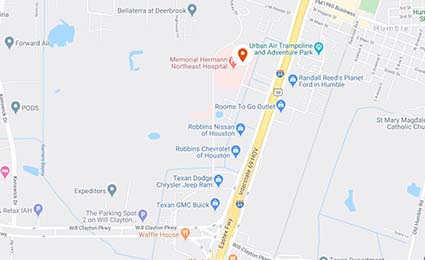Alzheimer’s Disease
What is Alzheimer’s Disease?
Alzheimer’s Disease is an irreversible, progressive disorder that causes brain cells to degenerate. It is the most common cause ofdementia, a continuous decline in cognitive ability. It leads to problems with memory, thinking, and behavior that can become severe enough to impair daily life. The diagnosis is a challenging one for patients and their families, and UTHealth Neurosciences is here to help provide comprehensive and compassionate care. Advances are being made regularly with the treatment and care of the estimated 5.5 million Americans 65 and older who have Alzheimer’s Disease.
To learn more about the new drug Aduhelm (aducanumab), please contact us at (713) 486-0500 or fill out anonline form here »
What You Can Expect at UTHealth Neurosciences
At UTHealth Neurosciences, our dedicated team uses the latest technology to help accurately diagnose and treat Alzheimer’s patients. We work in multidisciplinary teams of specialists who share insights, leading to better treatment decisions and outcomes. Throughout the treatment process, we will work closely with the doctor who referred you to ensure a smooth transition back to your regular care. While you are with us, you will receive expert care, excellent communication, and genuine compassion.
阿尔茨海默氏病的原因
While Alzheimer’s is age-related, it is not a normal part of aging. It is thought to be caused by changes in brain tissue, including increased amyloid plaques and neurofibrillary tangles that block communication among nerve cells. Neurons can’t survive when they lose their connections to each other. As neurons die, the corresponding area of the brain begins to degenerate, causing the memory loss.
阿尔茨海默氏病的迹象
For the majority of people with the disease, symptoms appear after the age of 65. In rare cases, onset may be earlier. At first, a person may experience some slight confusion or memory loss, which may seem to be a normal part of aging. It may be difficult for a person with Alzheimer’s to remember a conversation or a recent event. People with Alzheimer’s may repeat the same statements, forget appointments, get lost in familiar places, or misplace their possessions. Difficulty concentrating and multitasking are also key symptoms of Alzheimer’s. A person might struggle to find the right words or display impaired judgment. Eventually, they may be unable to recognize their loved ones. Changes in personality and behavior are also common. An Alzheimer’s patient may become depressed, apathetic, or irritable. They may withdraw from social situations.
Diagnosis
患者或亲密家庭成员通常通过自我报告的症状开始诊断过程。Uthealth神经科学医生在评估阿尔茨海默氏症的经验丰富的经验,评估记忆和思维能力;进行实验室测试和大脑成像;并对反射,肌肉张力,感觉,解决问题和协调进行身体和神经系统检查。这一系列测试将评估记忆并有助于排除其他条件。
虽然有些人可能会不愿意go to their doctor with the symptoms of Alzheimer’s, receiving an early diagnosis is beneficial and will give patients and their families a jump start on accessing helpful resources and treatments.
阿尔茨海默氏症的治疗
Alzheimer’s has no cure, but the doctors at UTHealth Neurosciences have pioneered models of care to treat symptoms and improve quality of life for patients and their caregivers. A team that includes neurologists, geriatric psychologists, and social workers will develop a plan that may include education, counseling, medication, and behavioral modifications.
目前,正在使用几种类型的阿尔茨海默氏症药物来治疗认知症状,包括胆碱酯酶抑制剂和美金刚。有时会开处方抗抑郁药以帮助控制行为症状。我们的专家团队还将帮助浏览可能有帮助的生活方式和环境变化。
联系我们
At UTHealth Neurosciences, we offer patients access to specialized neurological care at clinics across the greater Houston area. To ask us a question, schedule an appointment, or learn more about us, please click below to send us a message. In the event of an emergency, call 911 or go to the nearest Emergency Room.











